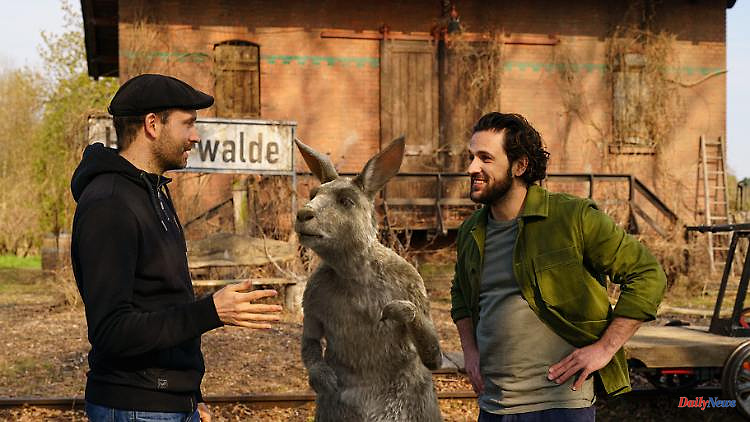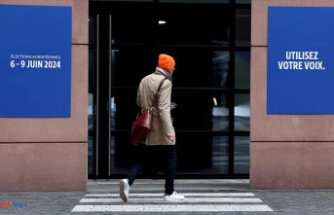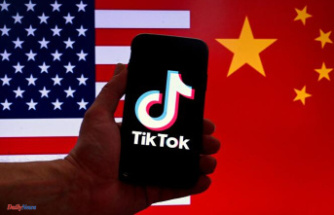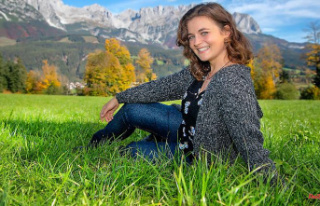The "Kangaroo Conspiracy" brings small artists and marsupials back to the cinema after the corona lockdown flop of the first part. Author Marc-Uwe Kling and leading actor Dimitrij Schaad talk to ntv.de about wild conspiracy theories and the hubris of filmmakers.
It's been 14 years since Marc-Uwe Kling and his kangaroo saw the light of day on the RBB radio station Fritz. A lot has happened since then. The former radio comedy format soon became a successful book series and an almost even more successful audio book series.
The fans were all the more excited about the first feature film in 2020. The fact that only a few viewers saw "The Kangaroo Chronicles" in the cinema was less due to the film itself than to the first hard lockdown in the pandemic. With "The Kangaroo Conspiracy" Marc-Uwe Kling follows up - not only as an author, but this time also as a director. In addition to the furry marsupial, Dimitrij Schaad can again be seen in a leading role, namely that of the author. Kling and Schaad spoke to ntv.de about working with the kangaroo, who was absent again that day, and why it's sometimes better to just shut up.
ntv.de: With "The Kangaroo Chronicles" you got into the middle of the first lockdown. The cinemas had to close a week after the film started. How bad was that for you?
Marc-Uwe Kling: It was just as shitty as you would imagine.
Dimitrij Schaad: Above all, it was weird that the posters were still hanging everywhere for months. I walked through empty Berlin and my painted face hung on the "International" cinema. For months, while I had nothing in my account and lived on unemployment benefits. That was really surreal. Still, I feel like it's good that we got at least a few more days at the cinema.
Kling: A week later would have been even worse. I had an advertising pillar right in front of the house on which the poster hung for over a year.
But none of that discouraged you from making another film - without being able to assess how the situation would develop when shooting started...
Kling: The goal is clear. We've started it now and we want to finish it.
When was the decision to "The Kangaroo Conspiracy" made? Has Corona postponed something here again?
Kling: I was already writing the sequel before the Corona wall came.
Schaad: I first heard the entire plot on a cinema tour while the previews were running. Then Marc told me the whole storyline in the car.
What was going through your mind when you were asked to take on the role of Marc and thus that of the author of the story? Was that the biggest challenge or was it more like playing alongside the kangaroo?
Schaad: The biggest challenge was that I entered a cosmos that already existed and that has many fans. It's not that common in Germany that you have adaptations available and can do something that people know and already have an image of. That was the craziest thing for me: the respect that this is already a very popular template.
What, in turn, did Dimitrij have to bring with him in order to be able to survive as a cabaret artist alongside the kangaroo?
Kling: Of course, he had to look a lot better than me first. Dimi is also an underpants model...
Schaad: But in the after pictures... oh no, the before pictures. Damn. gag dirty (laughs)
Kling: It was his special feeling for punchlines and timing.
Understand. But it's certainly not easy to cast a character that you've been dealing with for so long and that has autobiographical traits?!
Ring: Absolutely not. In the end it boils down to this: Dimi sent a casting video, I thought it was funny. And then I was in a play at the Maxim Gorky Theater in which he played the main role. I found that not only funny, but also clever. That made it clear to me.
Have you ever worried that making your character and the kangaroo visible might cause displeasure from the fans?
Kling: In the end I can only write or shoot with myself as an audience. I have to do something I like first. And then I can hope that someone else will like it too. But if I don't like it, what's the point? That only makes you unhappy. In this respect, the second film has succeeded well, I like it. What happens now is all bonus. Otherwise there is no such thing as "the people". The thing about an adaptation is that there will be people who like it and people who say they liked the book better. That's okay too. This fits Hitchcock's favorite joke: There are two goats in the film archive eating celluloid. One asks: how do you like it? Says the other: I liked the book better.
Schaad: Was there a template for you that was filmed and you ask yourself why they did it so crappy? Except for David Lynch's "Dune"...
Kling: That's exactly what I would have named now. But I really liked the new "Dune" from Villeneuve.
Dimitrij, how is it to have to stand alongside the kangaroo and act with him in front of the camera?
Schaad: Basically, as always, the kangaroo was great and a sensational actor, but it appeared very rarely. That's why it often had to be doubled and Volker Zack then took over. He's dressed in a spandex suit - but you don't need that for the animation, he just loves wearing spandex suits.
Kling: That had absolutely nothing to do with the shoot.
Schaad: He just likes that, he's a freak. In any case, the VFX company "Trixter Film" managed to photograph the body of the kangaroo perfectly so that it could be animated on top of it.
Kling: Dimi is also partially animated. There were phases between shooting days 2 and 38 when he and the kangaroo had fallen out completely and it was clear: If the kangaroo is there, Dimi won't come and vice versa. That's why we always had to animate each other. Sometimes neither of them came.
Schaad: Those were the most relaxing days for you.
Handy for part three, because then you don't need both of them on the set anymore.
Ring: Right. Then I don't need anyone anymore. There is also an Adobe tool that can be used to recreate the voice.
Schaad: I can completely understand that. If I were a director, I would be very happy about technologies that make it possible to no longer have to work with actors. They're just so incredibly exhausting.
Kling: Cartoons might be the solution.
While "The Kangaroo Chronicles" was still based on your books, you wrote a completely new story for "The Kangaroo Conspiracy". And with conspiracy myths and the climate crisis, you're hitting the ravages of time. Haven't you already despaired of the people here and there during your research?
Kling: On the one hand we added humor, on the other hand there were moments when writing the script and in the conception of the film when we thought we had to backtrack a little from reality. "If we depict reality, everyone will accuse us of having completely exaggerated." The sentence is also used in the film: "You can't exaggerate that anymore, you have to underline it, otherwise nobody will believe you." When you go online and google conspiracy theories, things get wild.
Afraid of trouble from those conspiracy believers you make fun of in the film, aren't you? If you can reach these people at all...
Kling: My approach is that the kangaroo always opens the door and, if in doubt, wears boxing gloves.
With your art and the kangaroo you repeatedly address socially critical issues. Is that your outlet, your way of making the sometimes bad observations more bearable?
Kling: It's certainly a kind of therapeutic writing, a way to get out of the doomscrolling depression - out of the powerlessness you feel when you read all the horror news. What can I do? Okay, I'm good at building punchlines and then at least build some that fire in the right direction.
"Zeit" once described Marc-Uwe as "the most influential left-wing intellectual in the country". You were not among the "intellectuals" who recently wrote an open letter criticizing the arms deliveries to Ukraine. Neither does Dimitrij, by the way...
Schaad: I think there is one area in which an "artist" can and should express oneself, and that is the area of an art product. This is something different than getting involved in a socio-political debate. There was a moment when shooting with Volker Zack: I made a gag and a few people laughed. Zack leaned over to me and said, "Remember, they MUST be nice to you." and thats the way it is. Everyone knows actors have super vulnerable egos, and that's why they say, "Smart. Very good idea. Interesting." Most of what you hear as an actor is, "Good idea, let's try it." Behind your back it's like, "What the hell. What's the idiot thinking?" But you rarely get that mirrored directly. I would estimate that actually 40 percent of a director's job is talking actors out of bad ideas as gently as possible.
Kling: "Interesting" is the director's no.
Schaad: And I have the feeling that certain colleagues who have been hearing for 20 or 30 years what clever and profound thoughts they have dramatically overestimate their intellectual capacities. Write a script, create a character that deals with the issues you care about. Do that. That is your job in this society! Speaking out publicly on elusive subjects without any sort of expertise or really smart attitude... I find that very questionable.
Kling: There is a nice saying: "If you had kept silent, you would have remained a philosopher." I don't have to comment on everything. If I don't know anything, there's no harm in saying, "I don't know. How could I? Why are you even asking me?"
When Jürgen Klopp was asked his opinion on Corona in a press conference, he preferred to refer to the experts because he is a football coach and not a scientist.
Schaad: It's amazing that on the one hand there is a crass kind of hostility toward experts, but on the other hand people are asked who can't contribute anything to something at all. And it's all happening at the same time.
Marc, you don't really like giving interviews anyway - although you've recently been a guest in several podcasts. Where does the interview hostility come from?
Schaad: Or did you just say that because you haven't received any interview requests for a long time?
Ring: Got it. The fact is that for ten years no one was interested in it. At some point I thought I'd just say I don't give interviews. But then it took on a life of its own.
And then suddenly everyone wanted? According to the dating motto: "Do you want to apply, make yourself rare?"
Ring: Exactly! No, in reality there are so many reasons. The last thing I want is to bore people. But an interview is only as good as my current condition and the questions that come up. I'm a bit control freaky with my work. When I write a story, I can revise it 20 times until everything is the way it wants to be. In an interview I have to give up control and let go. On the one hand I give it to you and on the other hand to my current self. My future self finds this difficult.
The control freak in you decided to direct the second film. Others study for years at the film academy...
Kling: I'm sure you want to know what drove me to do this!? Total hubris. And every day was exciting. The first few days were even more exciting. You are thrown in at the deep end and asked to swim. Well, that's not true. Nobody threw me, I jumped myself and had to see if I could swim.
Your past self decided at some point that there would be no kangaroo merchandise. Does your current self see it differently?
Kling: It's ambiguous. I find it partly admirable how Bill Watterson did it in "Calvin
Schaad: By the way: please buy my kangaroo t-shirts on Amazon.
Kling: Dimi put them on when the first film could no longer be shown.
Schaad: I needed money.
At least the complete storyboard for "The Kangaroo Conspiracy" is available as a book. This is a small step towards merch...
Kling: I think the storyboard is a work in itself, not just a merch product. We boarded the whole film and even then I was intrigued to be able to read the film. I thought it was a shame that that was going away. It's definitely a niche thing, you have to be interested in film to find it exciting. But when I held it in my hands for the first time - I also cursed it at times because I had to finish it parallel to the film - I thought: Great! For me, this is a process book. Nice to see how this film came about. You can see that the ideas have migrated almost 1:1 from the drawing to the film.
Marc-Uwe, Dimitrij, thank you for the entertaining interview.
Schaad: Too bad, we didn't even get to talk about my other product range of unauthorized kangaroo merch.
Nicole Ankelmann spoke to Marc-Uwe Kling and Dimitrij Schaad
"The Kangaroo Conspiracy" will be in cinemas from August 25th.
(This article was first published on Monday, August 22, 2022.)












